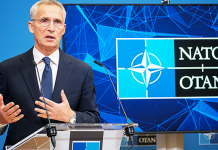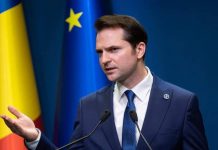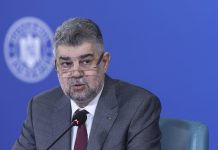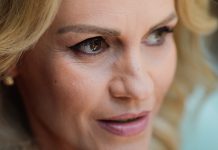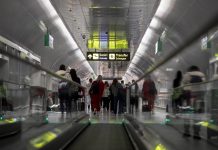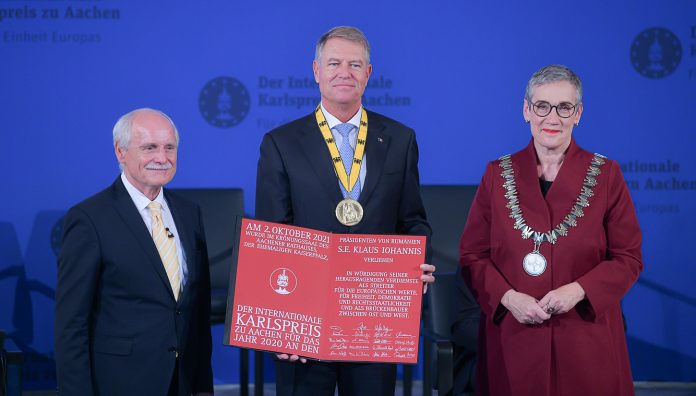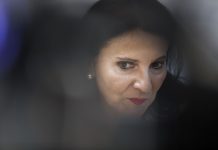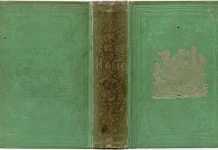President Klaus Iohannis won a second term in office on the simple promise to create a „normal Romania.”
Corona pandemic
Almost two years later, Romania is dogged by perennial political infighting and battling the fourth wave of the corona pandemic.
Despite the challenges and uncertainty, the 62-year-old ethnic German president with a schoolmasterly air is widely seen as “a safe pair of hands.” He has remained a constant and a reliable partner beyond his own country where his serious_ and arguably distant manner_ isn’t always popular with Romanians.
He’s regarded as the safest bet in the region to offer stability, ahead of a winter of rocketing energy prices, the ongoing pandemic and a resurgent Russia.
Charlemagne prize
After delays caused by the pandemic, the president on Saturday he was awarded the Charlemagne prize for European Unity. He was commended for upholding the rule of law and the fight against corruption.
He is the first Romanian to ever win the prestigious award which started in 1950. Previous laureates include UN Secretary-General Antonio Guterres in 2019, and French President Emmanuel Macron the year before. Other prominent winners were Chancellor Angela Merkel (2008) and Pope John Paul II (2004).
But the award is more than a recognition of his merits. The underlying message is Europe needs Mr Iohannis to “stay the course” as U.S. President Bill Clinton told Romanians during a brief visit to Bucharest when it failed to get on the NATO train in 1997.
Europe needs a stable and reliable partner in the region. The prize says they have picked Mr Iohannis for the job.
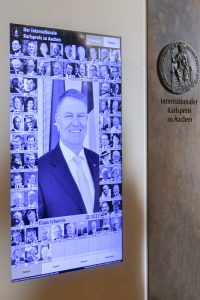
Bridge-builder
Acknowledging his merits, at the ceremony in the German city of Aachen, the Romanian leader was called „a great champion of fairness, the protection of minorities and cultural diversity, as well as an important mediator and bridge-builder between western and eastern European societies.” Jürgen Linden, spokesman for the board, made his comments ahead of the presentation.
The prize’s board of directors went further, saying the president had made Romania, a country that once had a „brutal dictatorship,” a home for European values in southeastern Europe.
European path
The board said the prize was meant to encourage Iohannis to continue resolutely on his „European path.” Note the word ‘encourage.’ Europe needs a reliable partner.
He is just one of a handful of leaders from the eastern end of the continent to have won the prize. Hungary’s last Communist Foreign Minister Gyula Horn won the prize in 1990 for actions that led to the collapse of the Berlin Wall.
Pro-European leader Dalia Grybauskaitė, Lithuania’s first woman president, who served two terms, won the prize in 2014.
European Commission
Former European Council president head Donald Tusk, probably the region’s most prominent pro-European figure, won the prize in 2010. And now Klaus Iohannis.
Looking ahead, European Council President Charles Michel predicted on Saturday that “2022 will be the year of European defense.” It was a stark acknowledgement that EU leaders must tackle widespread doubts that Europe can protect itself militarily.
Romania has important NATO bases on its soil, in the increasingly jittery Black Sea region, as well as inland. There are thousands of U.S. troops and rotating troops from other Alliance countries.
European defense
The 27 EU heads of state and government are due to discuss European defense and security over dinner Tuesday at a summit in Slovenia.
There are longstanding worries about Europe’s military capabilities and a lack of coordination between EU member countries, following the chaotic U.S.-led withdrawal from Afghanistan.
Tensions
Fresh tensions were caused when Washington announced a new Indo-Pacific strategic alliance with the U.K. and Australia that caught EU members, especially France off guard.
President Klaus Iohannis to receive award for “European stance” and “fight against corruption”


